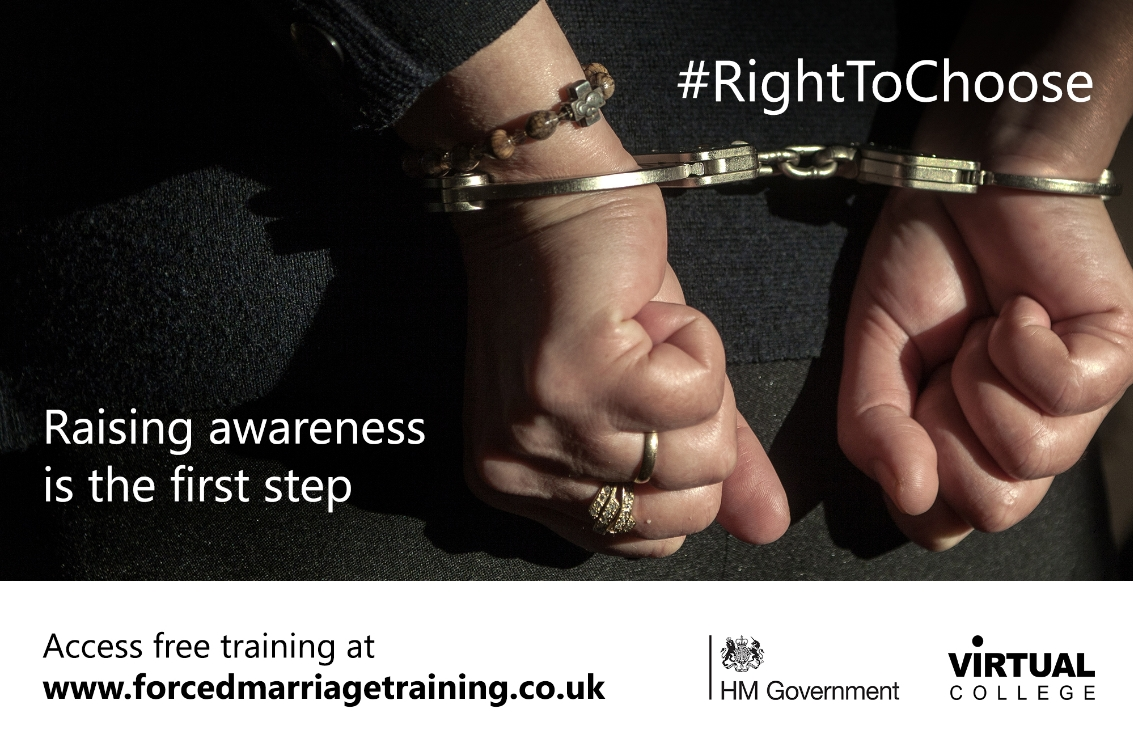Virtual College’s online ‘awareness of forced marriage’ course accessed by thousands
To support professionals dealing with forced marriage in the course of their work and quickly improve general awareness, the government commissioned online learning specialist, Virtual College, to produce a new, e-learning package.
Approximately 8,000 to 10,000 forced marriages of British citizens take place every year. A forced marriage is where one or both people do not consent to the marriage and pressure or abuse is used.
Forced marriage was made a criminal offence in 2014 and over 1,000 Forced Marriage Protection Orders have been made to prevent people from being forced into marriage and to assist in repatriating victims.
To support professionals dealing with forced marriage in the course of their work and quickly improve general awareness, the government commissioned online learning specialist, Virtual College, to produce a new, free e-learning package.
Since its launch in August last year, over 10,000 people have already accessed the free course and resource pack, helping to raise awareness rapidly and widely across a wide range of organisations and individuals.
Virtual College worked closely with the Forced Marriage Unit (FMU), a joint Foreign and Commonwealth Office and Home Office unit, to create the free online course which challenges perceptions and provides advice on the correct actions to take.
Chaz Akoshile, the Joint Head of the Forced Marriage Unit, commented: “(This is a) wonderful eLearning tool [that] complements the other documents in existence.
A free resource pack is also available to help organisations promote this important course and spread awareness.
Of the individuals who have now completed the online learning, two-thirds said they had limited understanding before taking the course.
Following completion, 98% per cent said they were now confident or very confident in dealing with forced marriage and 97% would recommend the course to a colleague or friend.
Half of the respondents said it had changed the way they now worked whilst the remainder already had effective procedures in place.
The Forced Marriage Unit has launched a summer campaign, #Righttochoose, with a range of events and resources which encourage additional awareness generation.
The forced marriage course is one in a series of free Vocational Online Open Courses (VOOC®s) produced by Virtual College.
The free forced marriage course and resources online are available at: www.forcedmarriagetraining.co.uk. The free female genital mutilation course and resources online are available at: http://bit.ly/1NDy3oZ.
Notes
Forced marriage
A forced marriage is where one or both people do not consent to the marriage and pressure or abuse is used. It is an appalling and indefensible practice and is recognised in the UK as a form of violence against women and men, domestic/child abuse and a serious abuse of human rights.
The pressure put on people to marry against their will can be physical (including threats, actual physical violence and sexual violence) or emotional and psychological (for example, when someone is made to feel like they’re bringing shame on their family). Financial abuse (taking your wages or not giving you any money) can also be a factor.
The Forced Marriage Unit
The Forced Marriage Unit (FMU) is a joint Foreign and Commonwealth Office and Home Office unit was which set up in January 2005 to lead on the Government’s forced marriage policy, outreach and casework. It operates both inside the UK, where support is provided to any individual, and overseas, where consular assistance is provided to British nationals, including dual nationals.
The FMU operates a public helpline to provide advice and support to victims of forced marriage as well as to professionals dealing with cases. The assistance provided ranges from simple safety advice, through to aiding a victim to prevent their unwanted spouse moving to the UK (‘reluctant sponsor’ cases), and, in extreme circumstances, to rescues of victims held against their will overseas.


